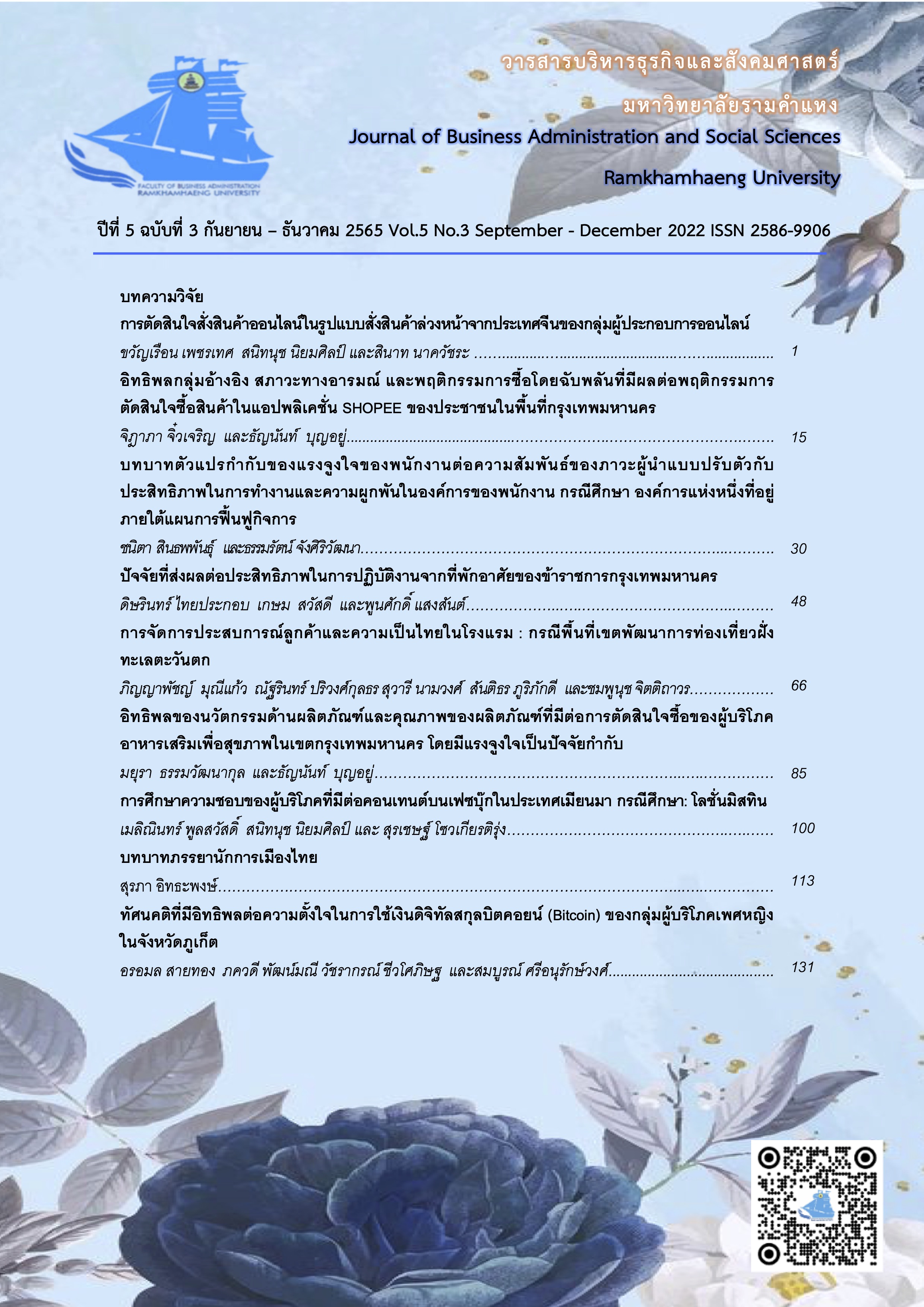Customer Experience Management and Thainess in Hotels: The Case of West Coast Tourism Development Zone
Main Article Content
Abstract
In this research investigation, the researchers examine customer experience management and Thainess in hotels by studying the experience management and Thainess of hotel business operators in the West Coast Tourism Development Zone i.e. Phetchaburi, Prachuab Khiri Khan, Chumphon, and Ranong provinces. The qualitative research was conducted based on the concept of phenomenology. Data were collected from October 2021 to February 2022. The technique of in-depth interview was employed with nine key informants. The method of purposive sampling was used to select eight subjects with the position of executive in hotel businesses. The structured sampling approach was used to select one subject who was the President of the Thai Hotel Association-Western Chapter. Data were analyzed from semi-structured in-depth interview forms from the key informants. Data were processed for the frequency of the research questions initially determined.
Findings showed that the key informants exhibited customer experience management and Thainess in four core issues as follows.
1) The aspect of personnel: Be able to communicate with customers, possess well-rounded knowledge of tourist attractions, and deliver experience through sensory perception to customers.
2) The aspect of management: Create standards for service work, organize accommodation environment for relaxation, decorate the location with area identity, retain natural areas, and create loyalty for customers to return for services.
3) The aspect of technology: Provide electronic equipment for customers, produce public relations to promote accommodation through appropriate social media on online channels, websites and the Facebook fan page.
4) The aspect of Thai food: Prepare fresh raw materials that can be acquired in the areas, decorate dishes to be more appetizing with modernness and delicious flavors.
Article Details

This work is licensed under a Creative Commons Attribution-NonCommercial-NoDerivatives 4.0 International License.
เนื้อหาและข้อมูลในบทความที่ลงตีพิมพ์ในวารสารบริหารธุรกิจและสังคมศาสตร์ มหาวิทยาลัยรามคำแหง ถือเป็นข้อคิดเห็นและความรับผิดชอบของผู้เขียนบทความโดยตรง ซึ่งกองบรรณาธิการไม่จำเป็นต้องเห็นด้วย หรือร่วมรับผิดชอบใดๆ
บทความ ข้อมูล เนื้อหา รูปภาพ ฯลฯ ที่ได้รับการตีพิมพ์ในวารสารบริหารธุรกิจและสังคมศาสตร์ มหาวิทยาลัยรามคำแหง ถือเป็นลิขสิทธิ์ของวารสารบริหารธุรกิจและสังคมศาสตร์ มหาวิทยาลัยรามคำแหง หากบุคคลหรือหน่วยงานใดต้องการนำบทความทั้งหมดหรือส่วนหนึ่งส่วนใดไปเผยแพร่ต่อ หรือเพื่อกระทำการใดๆ จะต้องได้รับอนุญาตเป็นลายลักษณ์อักษรจากวารสารบริหารธุรกิจและสังคมศาสตร์ มหาวิทยาลัยรามคำแหง ก่อนเท่านั้น
References
กระทรวงการท่องเที่ยวและกีฬา. (2558). ยุทธศาสตร์การท่องเที่ยวไทย พ.ศ. 2558-2560. กรุงเทพมหานคร: กระทรวงการท่องเที่ยวและกีฬา.
การท่องเที่ยวแห่งประเทศไทย. (2558). ท่องเที่ยววิถีไทย ความเป็นไทยในที่ลุ่มต่ำ. Retrieved from https://www.slideshare.net/kobbaka/tat-review-magazine-12015
การท่องเที่ยวแห่งประเทศไทย. (2562). แผนฯ 12 ว่าด้วยภาคและเมืองเรื่องการท่องเที่ยว. สืบค้นจาก http://www.tatreviewmagazine.com/web/menu-read-tat/menu-2016/menu-42016/752-42016-plan12
ชาย โพธิสิตา. (2547). ศาสตร์และศิลป์แห่งการวิจัยเชิงคุณภาพ. สถาบันวิจัยประชากรและสังคม, มหาวิทยาลัยมหิดล: นครปฐม.
ธันยพร ธิราวัฒน์. (2552). การแปลงวัฒนธรรมท้องถิ่นให้เป็นสินค้า กรณีศึกษาโรงแรมฮอไรซัน วิลเลจ แอนด์ รีสอร์ท. เชียงใหม่: มหาวิทยาลัยเชียงใหม่.
นิพัทธ์ชนก นาจพินิจ. (2554). การสร้าง “ความเป็นไทย” ในพื้นที่อาหารนานาชาติ ศาสตร์แห่งอาหารไทยในโรงแรมห้าดาวในกรุงเทพมหานคร. กรุงเทพมหานคร: จุฬาลงกรณ์มหาวิทยาลัย.
นุชนาฎ เชียงชัย. (2558). รายงานวิทยานิพนธ์เรื่อง การใช้อัตลักษณ์เพื่อการส่งเสริมการท่องเที่ยวของจังหวัดลำปาง. หลักสูตรบริหารธุรกิจมหาบัณฑิต, นครปฐม: มหาวิทยาลัยศิลปากร.
ปริศญา คูหามุข และธาตรี ใต้ฟ้าทูล. (2563). การสื่อสารอัตลักษณ์ความเป็นไทยผ่านการเป็นเจ้าภาพการประกวดมิสยูนิเวิร์ส 2018 ณ ประเทศไทย. วารสารธรรมศาสตร์, 39(1), 159-182.
พัชราภรณ์ คชินทร์. (2565). ความเป็นไทยกับบทบาทการเป็นทุนทางวัฒนธรรมและทุนทางสังคมในการท่องเที่ยวเที่ยว. วารสารมนุษยศาสตร์และสังคมศาสตร์ มหาวิทยาลัยพะเยา,10(2) 1-22.
พัลลภา ปีติสันต์, ชัญญา เหลี่ยวรุ่งเรือง, สมบุญ เกียรติรุ่งเรืองดี และวรวิทย์ ศัลยวุฒิ. (2011). การบริหารประสบการณ์ลูกค้า (Customer experience management). วิทยาลัยการจัดการ, กรุงเทพมหานคร: มหาวิทยาลัยมหิดล.
เพ็ญพรรณ จารุสาร, ศุมวรรษตรา แสนวา, และแววตา เตชาทวีวรรณ. (2557). การบริหารประสบการณ์ลูกค้าของห้องสมุดมหาวิทยาลัยวิจัยไทย. วารสารบรรณศาสตร์ มศว., 7(2).
ภัทรานิษฐ์ ทิพย์สุมาลัย. (2557). การวิเคราะห์วัฒนธรรมประดิษฐ์และการสื่อสารอัตลักษณ์กรณีศึกษา
อุตสาหกรรมสปาล้านนา. หลักสูตรศิลปศาสตรมหาบัณฑิต สาขาวิชาสื่อศิลปะและการออกแบบสื่อ,
เชียงใหม่ : มหาวิทยาลัยเชียงใหม่.
ยุพวรรณ นังคลาภิวัฒน์. (2560). การให้บริการด้วยความเป็นไทยในธุรกิจโรงแรมและการท่องเที่ยว.
วารสารวิชาการ มหาวิทยาลัยอีสเทิร์นเอเชีย ฉบับสังคมศาสตร์และมนุษยศาสตร์, 7(1), 52-60.
รามณรงค์ นิลกำแหง. (2562). แนวคิดการให้การบริการโดยเน้นอัตลักษณ์ความเป็นไทยในธุรกิจการท่องเที่ยวและโรงแรม. ใน การประชุมวิชาการระดับชาติ ครั้งที่ 4 (หน้า 1421-1434). ปทุมธานี: มหาวิทยาลัยราชภัฏวไลยอลงกรณ์ ในพระบรมราชูปถัมภ์.
สมาคมโรงแรมไทย. (2563). แบบประเมินมาตรฐานที่พักเพื่อการท่องเที่ยว. สืบค้นจาก http://www.thaihotels.org/1674351/แบบประเมิน
สำนักงานคณะกรรมการพัฒนาการเศรษฐกิจและสังคมแห่งชาติ. (2562). ยุทธศาสตร์ชาติ พ.ศ. 2561-2580. กรุงเทพมหานคร: สำนักงานเลขานุการของคณะกรรมการยุทธศาสตร์ชาติ.
สำนักงานปลัดกระทรวงการท่องเที่ยวและกีฬา. (2560). แผนแม่บทพัฒนาการท่องเที่ยวในเขตพัฒนาการท่องเที่ยวฝั่งทะเลตะวันตก (The Royal Coast หรือ Thailand Riviera) พ.ศ. 2560-2564. กรุงเทพมหานคร: กระทรวงการท่องเที่ยวและกีฬา.
สำนักงานปลัดกระทรวงวัฒนธรรม. (2561). แผนปฏิบัติราชการ ประจำปีงบประมาณ พ.ศ. 2561. กรุงเทพมหานคร : สำนักงานปลัดกระทรวงวัฒนธรรม.
สำนักพัฒนาบริการท่องเที่ยว กระทรวงการท่องเที่ยวและกีฬา. (2550). มาตรฐานที่พักเพื่อการท่องเที่ยว. กรุงเทพมหานคร: สำนักงานพัฒนาการท่องเที่ยว กระทรวงการท่องเที่ยวและกีฬา.
หญิงฤดี ภูมิศิริรัตนาวดี. (2554). การจัดการตวามรู้และการพัฒนาทุนทางปัญญาโดยแผนที่ความคิดของการสื่อสารในการบริการด้วยความเป็นไทย. เชียงใหม่: มหาวิทยาลัยเชียงใหม่.
อมรรัตน์ สุขขะ และนนทิภัค เพียรโรจน์. (2558). แนวทางการบริหารประสบการณ์ลูกค้าเพื่อพัฒนาผลการดำเนินงานของธุรกิจโรงแรมในจังหวัดภูเก็ต. วารสารบริหารธุรกิจศรีนครินทรวิโรฒ, 6(2). 74-83.
Andrew, P. Y., Guérin, A., de Leon, D. P., Ramakrishnan, K., Wu, E. Q., Mocarski, M., ... & Setyawan, J. (2011). Clinical and economic outcomes of multiple versus single long-acting inhalers in COPD. Respiratory medicine, 105(12), 1861-1871.
Bennett, R., Härtel, C. E., & McColl-Kennedy, J. R. (2005). Experience as a moderator of
involvement and satisfaction on brand loyalty in a business-to-business setting
-314R. Industrial marketing management, 34(1), 97-107.
Bonfanti, A., Vigolo, V., & Yfantidou, G.. (2021). The impact of the Covid-19 pandemic on customer experience design: The hotel managers’ perspective. International Jounal of Hospitality Management, 94(2021), 1-11.
Bravo, R., Martinez, E., & Pina, J. M. (2018). Effects of service experience on customer responses to a hotel chain. International Journal of Contemporary Hospitality Management. 31(1), 389-405.
Gentile, C., Spiller, N., & Noci, G. (2007). How to sustain the customer experience:: An overview of experience components that co-create value with the customer. European management journal, 25(5), 395-410.
Guestline. (2018, December 11). Hotelier Cloud Technology. Retrieved from https://www.guestline.com/th/blogs/technology-for-the-guest-experience-of-tomorrow/
Homburg, C., Jozic’, D., & Kuehnl, C. (2017). Customer experience management: toward implementing an evolving marketing concept. Journal of the Academy of Marketing Science, 45(3), 377-401.
Khan, I., Garg, R. J., & Rahman, Z. (2015). Customer Service Experience in Hotel Operations: An Empirical Analysis. Procedia - Social and Behavioral Sciences, 189, 266 - 274.
Kongprasert, N., & Porngarm, V., (2015). Tourist Perceptions to Cultural Identity: The Case of Thai
Experience. Procedia – Socail and Behavioral Sciences 195(2015), 167 – 174.
LaSalle, D., & Britton, T. A. (2003). Priceless. Turning ordinary products into extraordinary
experience, Harvard Business School Press, Boston, Massachusetts.
Nobar, H. B. L., & Rostamzadeh, R. (2018). The Impact of customer Satisfaction, Customer Experience and Customer Loyalty on Brand Power Empirical Evidence from Hotel Industry. Journal of Business Economics and Management, 19(2), 417-430.
Palmer, A. (2010). Customer Experience Management: A Critical Review of an Emerging Idea. Journal of Services Marketing, 24(3), 196 - 208.
Royal Coast Review. (2020, April 14). The ‘Royal Coast of Thailand’; What’s in a Name?. Retrieved
from https://royalcoastreview.com/2020/08/the-royal-coast-of-thailand-whats-in-a-name:/
Ryu, K., & Jang, S. (2008). DINESCAPE: A scale for customers' perception of dining environments. Journal of Foodservice Business Research, 11(1), 2-22.
Schmitt, B. H. (2003), Customer Experience Manament: A Revolutionary Approach to Connecting with Your Customers. New York: John Wiley & Sons.
Verhoef, P. C., Lemon, K. N., Parasuraman, A., Goggeveen, A., Tsiros, M., & Schlesinger, L. A.. (2009). Customer Experience Creation Determinants, Dynamics and Management Strategies. Journal of Retailing, 85(1), 31-41.


